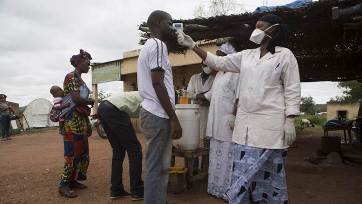Sudan, Ethiopia coordinate precautionary measures against Ebola virus
October 2, 2014 (KHARTOUM) – The governments of Sudan and Ethiopia held a joint coordination meeting in which they agreed to form a committee that would receive courses by specialists in the fields of combating epidemics and diseases in the wake of the Ebola virus threat.

Sudan announced last August that it has elevated the state of alert to prevent infiltration of the Ebola virus through visitors from other countries.
The health minister stressed at the time that Sudan is Ebola free but said that the government has undertaken precautions to prevent the entry of the disease from neighboring countries.
He disclosed that medical committees have been placed at the borders and added that they have initiated an awareness campaign with the distribution of educational brochures for the training of health personnel.
The European Union confirmed last Thursday its cooperation with Sudan to confront the epidemic and pledged to provide 500 million Euros to help African countries affected by the disease. It also praised the measures established by the Sudanese Ministry of Health to prevent the entry of the virus into the country.
The joint African Union and the United Nations mission in Darfur (UNAMID) imposed restrictions last August on the travel of its personnel between West Africa and Darfur to prevent transmission of the Ebola virus.
UNAMID has more than 19,000 soldiers and police in Darfur mostly from East, West, and Central Africa where the deadly disease spreads.
According to Reuters, Ebola is one of the deadliest diseases to man as it kills up to 90% of those infected. Discovered nearly 40 years ago deep in the forests of central Africa, its symptoms include internal and external bleeding, diarrhea and vomiting.
The virus is endemic to Democratic Republic of Congo, Uganda, South Sudan and Gabon, and scientists initially believed that Central Africa’s Zaire strain of the virus was responsible for the outbreak.
There is no vaccine or cure for Ebola but some countries said they are using experimental drugs to treat infected patients.
So far, at least 7,200 people have been infected with Ebola in Guinea, Liberia and Sierra Leone, and 3,300 have died since the outbreak started late last year, World Health Organization (WHO) said late Wednesday.
(ST)
